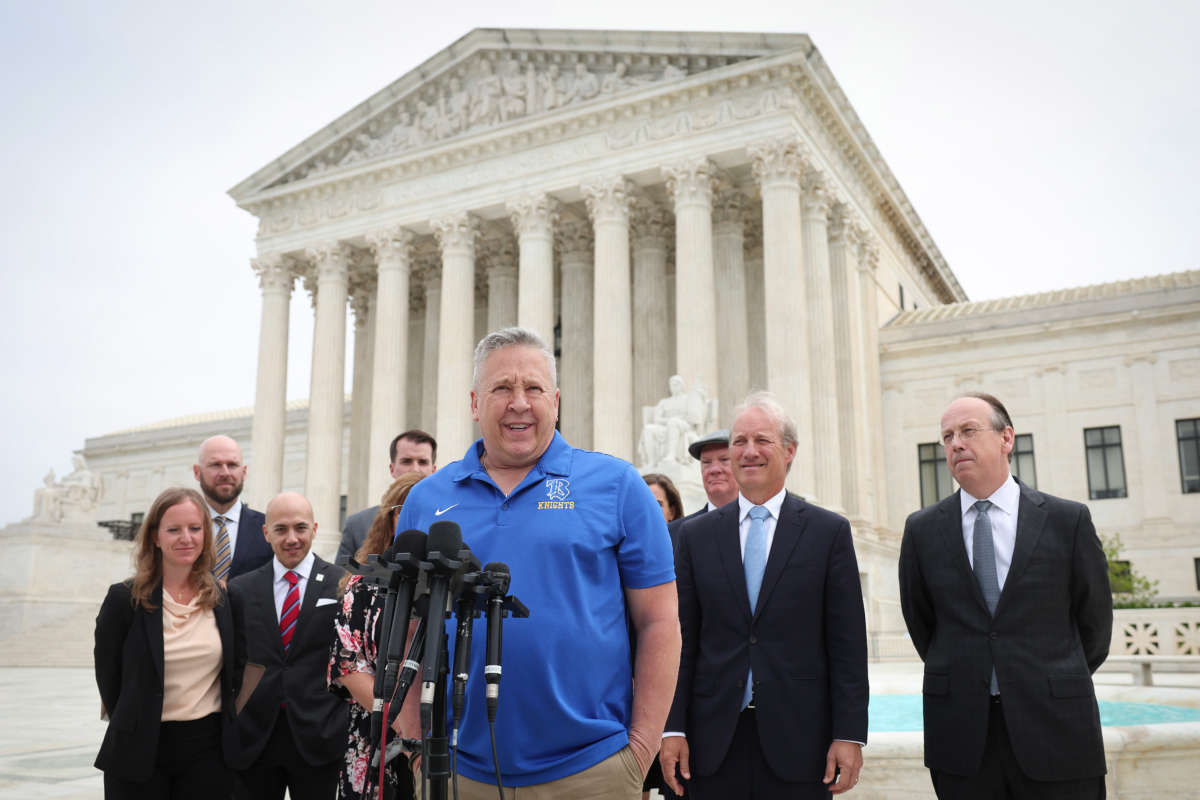Support justice-driven, accurate and transparent news — make a quick donation to Truthout today!
Supreme Court justices continued their far right crusade on Monday, handing down a decision that could open the door for public school teachers to compel their students to join them in prayer, eroding the already thin separation of church and state in the U.S.
In a 6 to 3 decision, the Supreme Court’s extremist right-wing members ruled in favor of a Christian high school football coach in Bremerton, Washington, who has for years led students in prayer after games — and at one point, in the locker room — though he has reportedly stopped the practice. The Court’s three liberal justices dissented.
The justices overturned a lower court’s finding that the coach’s actions violated laws disallowing public schools from promoting religion. Justice Neil Gorsuch wrote the decision for the majority, all six of whom are Christian, saying that the coach, Joseph Kennedy, didn’t coerce the students into prayer, and claiming that Kennedy had merely offered a personal prayer, meant only for himself.
If Kennedy were punished for this or barred from praying after games, the majority said, this would have amounted to a violation of his right to practice his religion.
However, dissenting justices argued that the opposite is true, and that it is students’ religious rights that are being trampled because of public schools’ disproportionate influence on their religious beliefs. “This decision does a disservice to schools and the young citizens they serve, as well as to our Nation’s longstanding commitment to the separation of church and state,” Justice Sonia Sotomayor wrote in the dissenting decision.
Supreme Court rules that a football coach at a public school has a constitutional right to pray midfield briefly, quietly, and in a personal capacity.
Justice Sotomayor included a few pictures in her dissenting opinion showing what the coach was actually doing: pic.twitter.com/rAnME739PV
— Cristian Farias (@cristianafarias) June 27, 2022
The majority decision once again weakens the division between modern religious freedoms and historical limits to individuals’ religious practices, Sotomayor continued. She wrote that Kennedy was never punished for his private prayers.
Rather, the school district took issue with the fact that Kennedy had invited the players to join in his prayers — a practice that Gorsuch even acknowledged in the majority ruling — and appeared on the local media discussing the prayers, praying with his students so often that he became well known locally for the practice. Kennedy had also become a celebrity among the Christian right.
“Today’s decision is particularly misguided because it elevates the religious rights of a school official, who voluntarily accepted public employment and the limits that public employment entails, over those of his students, who are required to attend school,” Sotomayor wrote. “In doing so, the Court sets us further down a perilous path in forcing States to entangle themselves with religion, with all of our rights hanging in the balance.”
Indeed, this decision is one of many recent decisions in support of religious plaintiffs, often Christian, including a ruling in May forcing the state of Maine to offer tuition aid to religious private schools in another decision that will further engrain “a far right vision of the role of religion in U.S. society,” as Sasha Abramsky wrote for Truthout.
The consequences of Monday’s ruling could be devastating for students and teachers of minority faiths in the U.S., opponents of the Court’s decision say. The justices’ ruling “could leave public schools vulnerable to religious displays from staff and educators,” wrote New York Magazine’s Sarah Jones. “Even if they aren’t forced to participate in prayer, social pressure could coerce them into feeling as though they must.”
Press freedom is under attack
As Trump cracks down on political speech, independent media is increasingly necessary.
Truthout produces reporting you won’t see in the mainstream: journalism from the frontlines of global conflict, interviews with grassroots movement leaders, high-quality legal analysis and more.
Our work is possible thanks to reader support. Help Truthout catalyze change and social justice — make a tax-deductible monthly or one-time donation today.
